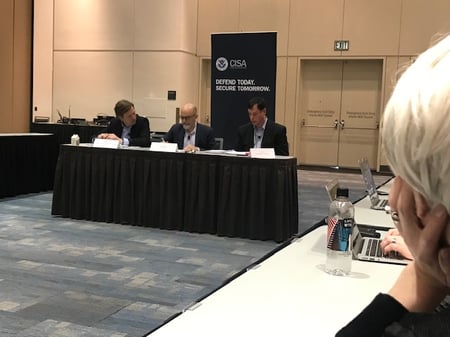The U.S. government continues to push back against Chinese tech.
This time it's a telecom giant.
FCC: too much risk from Chinese company
Federal Communications Commission chairman Ajit Pai says it is too risky to allow China Mobile to enter the U.S. market:
“Safeguarding our communications networks is critical to our national security. After reviewing the evidence in this proceeding, including the input provided by other federal agencies, it is clear that China Mobile’s application to provide telecommunications services in our country raises substantial and serious national security and law enforcement risks."
The telecommunications giant applied in 2011 to the FCC. Now, it's decision time. The full FCC vote will happen during May 2019.
See the FCC Chairman's statement on China Mobile risk.
U.S. cyber leaders on China and 5G security risk
The FCC Chairman's statement is the continuation of a we can't trust you theme regarding China.
[RELATED: 8 Steps Huawei Took to Steal IP from T-Mobile and Cover It Up]
SecureWorld was at a press briefing recently with Cybersecurity and Infrastructure Security Agency (CISA) Director Chris Krebs (left in image below) and NSA Senior Cybersecurity Advisor Rob Joyce (right).

This is how the NSA's Rob Joyce framed the 5G debate and the lack of trust in Chinese tech companies:
"A lot of people talk about Chinese spying and 5G, but what I want people to understand is it's not just about the confidentiality of the information. It is about the things we’re going to host on those networks.
I bring it back three, five, even 10 years ago where we had these 'new' smartphones. The smartphones emerged and they didn’t have new technology in any one sense—they were able to text, they were able to connect to the web, they were able to access the data that lived in the cloud-based services, they had GPS—but they brought together all this stuff in an easily usable form.
So now at that point, what we found is new things and new creative technologies emerge. No one thought of services like Uber, but this integration of these technologies and the evolution of these technologies gave us new business opportunities and new things throughout society.
5G is going to give us more bandwidth, higher densities, lower latencies, and none of that is amazingly transformative on its own. But once we have that fabric, we’re going to innovate the way the American economy innovates on top of that fabric. And then we’re going to have to trust that fabric.
The question is, are you going to be able to trust the providers of the infrastructure inside that?
When I say trust, there’s a desire to examine it. We will work hard on standards and on examining products. But I can tell you with the two hats we have at NSA—both the information assurance, cybersecurity hat and the foreign intelligence hat—it is really hard with something of that size and magnitude to lock it down where it can’t be exploited.
So you need to have a trust relationship with the people who build the house. If it’s built without a solid foundation, you’re going to be unhappy with the way that turns out.
And that’s how we view it in the 5G discussion. It really isn’t about the ‘show me the smoking gun intelligence’ about how they’re going to steal my information, it’s ‘can I trust it and what are we going to rely on that for?'. It is going to be something so intertwined with our society."
And in the case of China Mobile, what is more intertwined with society right now than mobile carriers?
FCC Chairman Pai makes it clear that the ability to trust Chinese tech, in this case, is not there:
"I hope that my colleagues will join me in voting to reject China Mobile’s application.”
We'll find out if they do in a few weeks.




